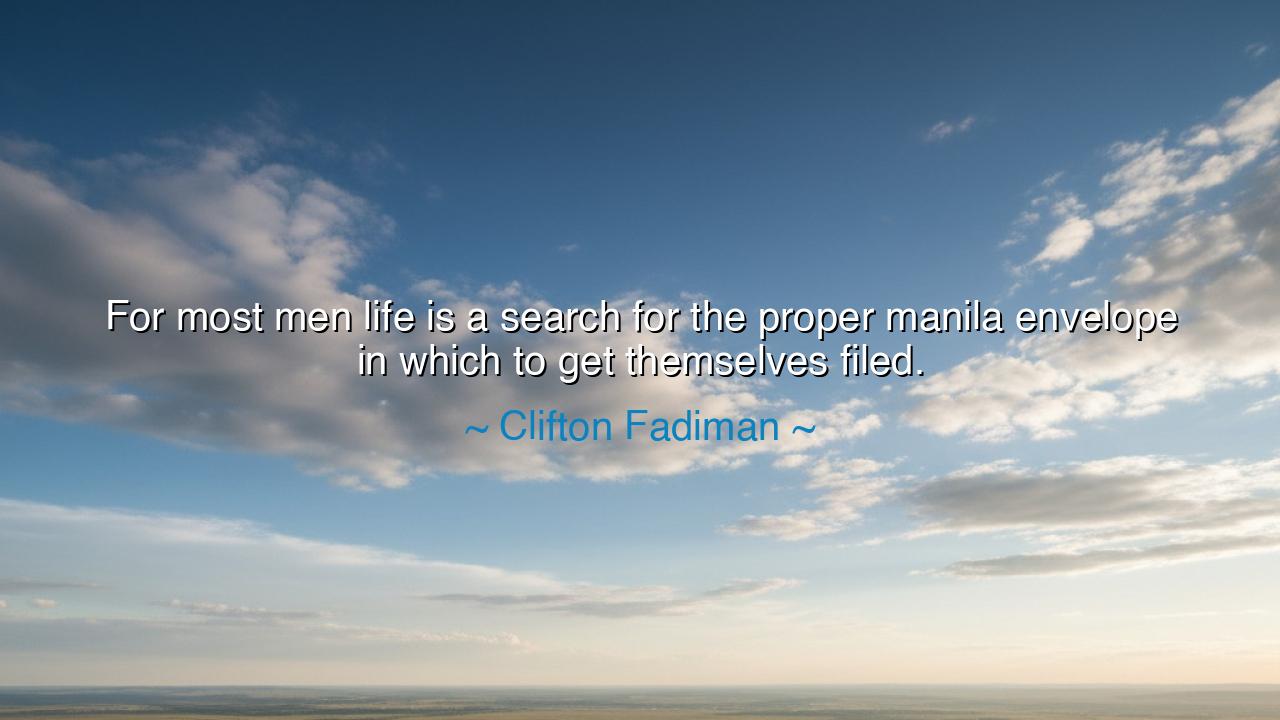
For most men life is a search for the proper manila envelope in
For most men life is a search for the proper manila envelope in which to get themselves filed.






The words of Clifton Fadiman strike with quiet irony yet conceal a profound truth: “For most men life is a search for the proper manila envelope in which to get themselves filed.” What he reveals is not merely a jest about paperwork, but a parable about the human condition. Too often, people spend their lives seeking a box, a label, a tidy category in which to place themselves. They yearn not for freedom, but for order, for a sense of belonging, even if it means surrendering their boundless potential to the confines of a single envelope.
The ancients warned of this temptation. The philosophers of Greece spoke of man’s search for identity and purpose. Socrates reminded his students that “the unexamined life is not worth living,” for a life lived only in pursuit of fitting neatly into society’s expectations is no true life at all. The envelope, then, becomes a symbol of conformity, of the safe but narrow existence where men choose to be categorized rather than to create. It is easier to be filed away than to risk standing apart, uncontained, undefined.
Consider the story of Galileo. The world of his time had prepared a very neat envelope for him: a respected professor, loyal to the Church’s doctrines, a scholar who would reinforce tradition. But Galileo refused this filing. Instead, he broke from the category expected of him, choosing truth over comfort, discovery over conformity. For this rebellion he suffered trial and house arrest, yet his courage gave the world the gift of modern science. Had he accepted the manila envelope, he would have been remembered as a dutiful teacher, not as a visionary who altered the cosmos.
Fadiman’s words also speak to the quiet tragedy of the ordinary. Many men search for careers, titles, or roles not because they are their true calling, but because they offer a place in the drawer of society. They long for a label—“lawyer,” “doctor,” “manager,” “citizen”—and once placed there, they cease to grow. The envelope is comfortable, but it suffocates the spirit. It provides identity, but it steals imagination. It gives safety, but it denies greatness.
And yet, there is no shame in desiring order. Human beings fear the vast wilderness of possibility. To live without a label is to wander in uncertainty, to face the abyss of freedom. But the ancients would remind us: it is only in the abyss that one learns to fly. Heroes are not remembered because they found the right drawer to rest in, but because they refused to be filed away. Alexander, Da Vinci, Joan of Arc—all defied the envelopes prepared for them and chose instead to write their own categories in history.
The lesson is plain: do not spend your days searching for the proper envelope. Instead, spend them tearing open envelopes, refusing to be contained by them. Seek not to be classified, but to be whole. Seek not to be defined by others, but to define yourself by your deeds, your passions, your love, your courage. For the manila folder grows brittle with time, but the soul that has dared to live remains immortal in memory.
Practical action lies before us: examine the labels you have accepted—those given by family, by work, by society—and ask: do these names serve my spirit, or do they file me away? Cultivate creativity, risk, and authenticity. Try what is unfamiliar, speak what is true, even if it does not fit neatly. Encourage others to do the same, so that together we may build a world not of drawers and files, but of lives lived fully.
So let us remember the wisdom in Fadiman’s irony: most men seek only an envelope, but the few who dare to live beyond categories change the destiny of the world. Be among the few. Refuse to be filed. Write your own story, and let it be one too vast for any folder to contain.






AAdministratorAdministrator
Welcome, honored guests. Please leave a comment, we will respond soon